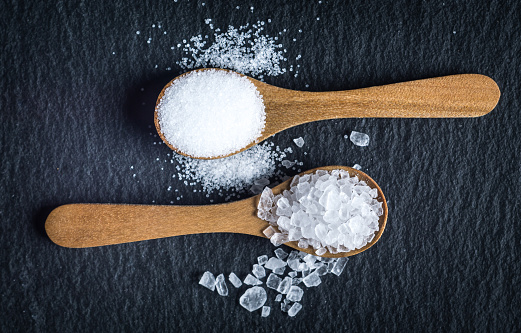
About 10 percent of all heart-related deaths are linked to high sodium levels. Although this is an extreme result, most of us experience symptoms of sodium intake irregularities without even knowing it. Here are some of the ways that our body is telling us that salt isn’t being absorbed properly, and what you can do about it.
You’re experiencing extreme bloating
When too much salt is in your bloodstream, your body starts to hold on to more fluid. As a result, this fluid causes you to look and feel bloated since you have more liquid inside of you than usual. If your abdominal area is extremely bloated for more than a few days, your body may have an issue with absorbing salt and you should see a doctor ASAP.
Your blood pressure levels change
Speaking of excess fluid, holding onto too much liquid in the body can cause a spike in blood pressure levels. A 2019 study from the Harvard Medical School outlines that there is a consistent direct relationship between salt intake and blood pressure. The report goes on to say that about 1,800 milligrams of sodium can significantly decrease individuals' blood pressure across the board. In layman's terms, the more salt you consume, the higher your blood pressure will be.
You crave more salt
Our taste buds can get quite used to saltiness the more you consume it—which means you can start craving it more than usual. Try healthy foods that satisfy salt cravings to get your fix without increasing your sodium intake. Our brains and bodies are designed to enjoy salt because it’s necessary for survival, but throughout history, finding salt was difficult so craving salt was a bit more than a survival mechanism.
Things have changed over time, however. The average American eats far too much salt. The American Heart Association says...
that adults should consume no more than 2,400 milligrams (mg) of salt per day. That’s no more than one teaspoon of salt per day. Most people take in close to 3,400 mg each day, however.
Your kidneys are affected
Higher blood pressure can also lead to kidney failure. The arteries are strained, leading to forcing the kidneys to work harder. According to a 2013 study in the Journal of the American Society of Nephrology, chronic kidney disease patients saw improved function in the organ with decreased salt intake—and that may be because increased salt intake is what led to their kidney problems in the first place.
Your brain gets a bit foggy
When your blood pressure increases, it can also lead to clouded brain function. A 2011 study published in the Neurobiology of Aging found that a high-salt diet and non-active lifestyle leads to significantly more cognitive decline in older age.
Your risk of heart disease increases
In a 2017 study by the Cleveland Clinic, researchers found that those who ate more than 13.7 grams of salt daily nearly doubled their risk of heart failure over a 12-year follow-up period. An increased risk of developing heart failure was observed in subjects who consumed 6.8 grams or salt or greater.
So, in sum, please be mindful of your salt intake because more than likely, your body will tell you when enough is enough.








